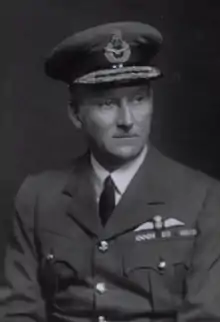F. H. Maynard
Air Vice Marshal Forster Herbert Martin "Sammy" Maynard, CB, AFC (1 May 1893 – 26 January 1976) was a senior commander in the Royal Air Force and a flying ace credited with six aerial victories during the First World War.[1] He also served as the Air Officer Commanding Malta during the early part of the Second World War.
Forster Herbert Martin Maynard | |
|---|---|
 Forster Maynard by Elliott & Fry | |
| Nickname(s) | Sammy |
| Born | 1 May 1893 Waiuku, New Zealand |
| Died | 26 January 1976 (aged 82) |
| Allegiance | United Kingdom |
| Service/ | Royal Navy (1914–18) Royal Air Force (1918–45) |
| Years of service | 1914–45 |
| Rank | Air Vice Marshal |
| Unit | No. 1 Squadron RNAS |
| Commands held | No. 19 (Reconnaissance) Group (1944–45) RAF Mediterranean (1940–41) University of London Air Squadron (1935–37) No. 12 Squadron (1929–30) |
| Battles/wars | First World War Second World War |
| Awards | Companion of the Order of the Bath Air Force Cross Mentioned in Despatches (4) Commander of the Legion of Merit (United States) |
| Relations | Air Chief Marshal Nigel Maynard (son) |
His son, Nigel Maynard, also became an air marshal in the RAF.
Early life
He was born in New Zealand to a Church of England clergyman. The family returned to England two years later and he was educated at St John's School, Leatherhead, and University College London.[2]
World War I
Maynard joined the Royal Naval Division in 1914 as an engineer. He transferred to the Royal Naval Air Service the following year. After training, he became an instructor until 1916.[3]
In January 1917, he was posted to No. 1 Squadron RNAS on the Western Front. While there, flying a Sopwith Triplane, he ran up a string of six victories from 29 April through 1 June 1917; his final tally included an enemy fighter set afire, another one destroyed in conjunction with a couple of squadron mates, and four enemy planes driven down out of control, including one shared with Cyril Ridley and six other pilots.[3]
In September 1917, he was transferred to the aircraft depot at Dunkirk. After his return to England, he was injured in a crash. After recovery, he became officer commanding of a training depot.[3] He subsequently received the Air Force Cross for his work in training.
Inter war
Between the wars he attended the Imperial Defence College. He was posted to HQ Iraq Command and served administrative positions for the Air Staff.
World War II
When Italy declared war in June 1940, a part of the very limited strength of the fighter squadron based at Malta were four Gloster Gladiators, which were found in crates marked "Boxed Spares – Property of the Royal Navy" (these having been left by HMS Glorious in April). Maynard obtained permission to assemble them, and three of these units, named "Faith", "Hope", and "Charity", they were part of the initially limited defence during the Siege of Malta.[4]
After he was replaced on Malta, he was AOA, HQ RAF Coastal Command. In 1944 he was AOC of No. 19 (Reconnaissance) Group.
Notes
- Forster Maynard The Aerodrome, Retrieved 16 February 2010.
- Who's Who 2016. Published by Oxford University Press, 2016
- Above the Trenches: A Complete Record of the Fighter Aces and Units of the British Empire Air Forces 1915–1920. p. 265.
- Playfair, Vol. I, page 98.
References
- Forster Maynard at New Zealand Fighter Pilots Museum
- Above the Trenches: a Complete Record of the Fighter Aces and Units of the British Empire Air Forces 1915–1920. Christopher F. Shores, Norman L. R. Franks, Russell Guest. Grub Street, 1990. ISBN 0-948817-19-4, ISBN 978-0-948817-19-9.
- Playfair, Major-General I.S.O.; Molony, Brigadier C.J.C.; with Flynn, Captain F.C. (R.N.) & Gleave, Group Captain T.P. (2009) [1st. pub. HMSO:1954]. Butler, Sir James (ed.). The Mediterranean and Middle East, Volume I: The Early Successes Against Italy, to May 1941. History of the Second World War, United Kingdom Military Series. Uckfield, UK: Naval & Military Press. ISBN 1-84574-065-3.
- Air Vice-Marshal F H M Maynard – Air of Authority – A History of RAF Organisation
| Military offices | ||
|---|---|---|
| Preceded by Robert Leckie |
Air Officer Commanding RAF Mediterranean 1940–1941 |
Succeeded by Hugh Lloyd |